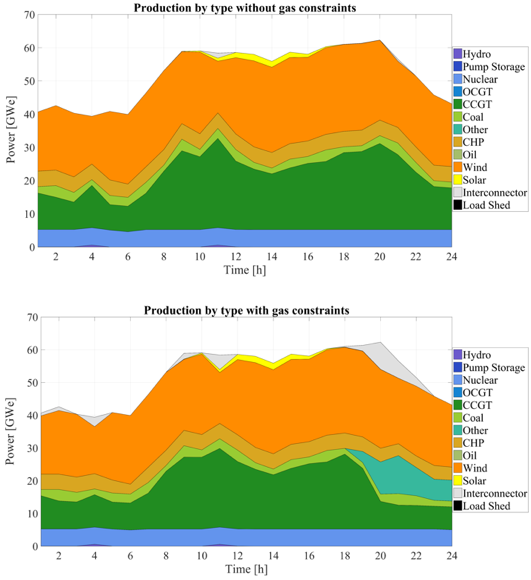Safe operations of interdependent gas and electric systems
Gas and electric networks are characterized by strong interdependencies, which occur at the level of gas-fired power plants and electric compressors. Due to the increasing exploitations of gas as energy resource to balance fluctuating renewables, the operations of these infrastructures are increasingly coupled. Therefore, combined gas and electric analysis becomes necessary.
The Reliability and Risk Engineering group develops models for the risk analysis of interdependent gas and electric networks at a national and international scale. The operations of the electric power system are planned via stochastic optimization that identifies the cost-effective configuration of generators and reserve scheduling, while accounting for the intrinsic volatility of renewable resources, i.e. wind. The gas system is represented as a transient one-dimensional flow model, which quantifies pressure and flow values across the pipeline network during normal and abnormal operations. Following the usual gas supply priorities, pressure issues in the gas network are mitigated via the curtailment of electric gas loads, i.e. gas-fired power plants, and gas demand from other customers as the last line of defense.
The methodology here detailed is used for investigating how contingencies in one network, i.e. unanticipated sudden events, may affect the operations of the other system, and eventually lead to loss of electricity and gas supply to the final customers. The set of investigated topics encompasses: the evaluation of the consequences of loss of components or loss of supply, the management of abrupt wind fluctuations, the day-ahead scheduling of generators and reserve in high-wind penetration systems and the impact of alternative conversion technologies, such as Power-to-Gas.
Case studies for the electric power and gas transmission networks of Great Britain (GB) show the techno-economic impact of gas operation limitations on the day-ahead scheduling of generators.
More information about this project can be found on the project website. The ESC member involved in this project is Prof. Giovanni Sansavini, head the Reliability and Risk Engineering Laboratory. Research in the Laboratory of Reliability and Risk Engineering is aimed at the development of innovative techniques and hybrid analytical and computational tools suitable for analyzing and simulating failure behavior of engineered complex systems.
